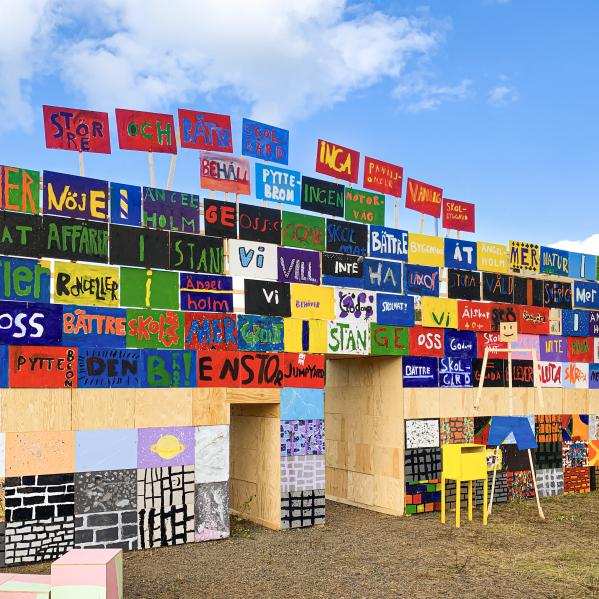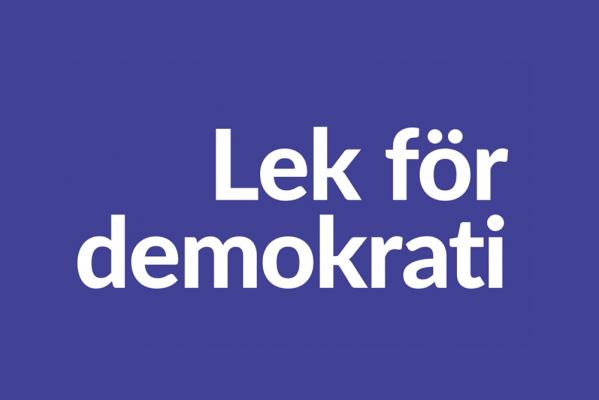Formas, the Swedish Arts Council, The National Board of Housing, Building and Planning, ArkDes and the Swedish National Heritage Board have jointly announced research funding to fund projects that can create new knowledge and understanding of how artistic and cultural-historical values can be strengthened in society's common spaces.
Play for Democracy is built around the plans for a new town hall in Ängelholm. The site and the municipality's plans for a new public building are the starting point for the project, which aims to develop a new interdisciplinary working method where the public space is designed based on artistic processes and children's play. The experiences from the participating children's creation and reflection are used in a proposal for how the Convention on the Rights of the Child can be translated into action and become a natural part of urban development. The project explores a new method for dialogue in municipal planning processes. Through the artistic process, new networks are created between children, politicians, community planners, citizens and architects. The evaluation of the project will generate a general method that can be used in different contexts both in Sweden and internationally.
Konstfrämjandet Skåne, Ängelholm municipality and Tankesmedjan Movium at SLU, together with an architect and an artist, are preparing a pedagogical plan for the participating school in Ängelholm. Konstfrämjandet Skåne runs the first phase where children enter an artistic process through play. Form/Design Center is the location for exhibitions, seminars and discussions in which all parties participate. Lund University LTH collects and compiles experiences together with Ängelholm Municipality. The research results from Lund University LTH will serve as the foundation for scientific articles and guidelines for how new projects around the country's municipalities can be implemented.
Through play and practical artistic processes, a foundation is created for the method development for which the project aims at. The method can be used both in Sweden and abroad, based on each place's specific characteristics and the children's different experiences and needs. At the same time, the project aims to develop a form of interdisciplinary collaborations where different perspectives and experiences are exchanged. The goal is to engage property owners, municipal officials, architects, artists, educators, and other actors in developing a sustainable and democratic method for children's influence in the various phases of urban planning.
Per-Johan Dahl – Senior lecturer at the Department of Architecture and Built Environment, Lund University LTH:
– Can artistic processes and construction be a good way to explore complex issues about our designed living environment together with children, on their terms? These are issues that are explored within the framework of the Play for Democracy project.
Cecilia Sterner – Artist and business manager Konstfrämjandet Syd:
– What happens if we invite children and young people to an artistic process about democracy, architecture, city, design, and play? How can we strengthen children's right to co - create the public environment, our common life and future?
Pernilla Theselius – City architect Ängelholm municipality:
– Planning for a new town hall is a long process that provides opportunities for new collaborations. The inclusion of society's youngest citizens is important from several aspects in the face of such a symbol-laden project as a town hall.
Lena Jungmark – national coordinator for children and young people, Tankesmedjan Movium at SLU:
– Children's participation in The UN Convention on the Rights of the Child must be translated into action and become a natural part of urban development. Children's language is not the same as that of adults, and they have the right to express themselves in their own way – through play, movement and imagination as well as through their creativity and their way of solving problems. Adults are responsible for the children's commitment and participation being taken seriously.
Johanna Sjögren Duthy – Manager, public activities at Form/Design Center:
– Form/Design Center's role as a national node for a designed living environment, we work both in a coordinating manner but also in actively making the subject visible, not least to a wider audience, through exhibitions, seminars and discussions. Play for Democracy will be an important project in the conversation about the design of the places where we live, work and live our lives.

